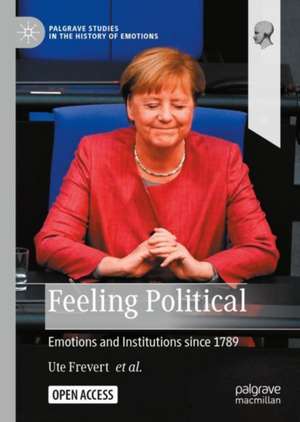Feeling Political: Emotions and Institutions since 1789: Palgrave Studies in the History of Emotions
Autor Ute Frevert, Kerstin Maria Pahl, Francesco Buscemi, Philipp Nielsen, Agnes Arndt, Michael Amico, Karsten Lichau, Hannah Malone, Julia Wambach, Juliane Brauer, Caroline Moineen Limba Engleză Paperback – 7 apr 2022
| Toate formatele și edițiile | Preț | Express |
|---|---|---|
| Paperback (1) | 358.02 lei 6-8 săpt. | |
| Springer International Publishing – 7 apr 2022 | 358.02 lei 6-8 săpt. | |
| Hardback (1) | 430.79 lei 6-8 săpt. | |
| Springer International Publishing – 7 apr 2022 | 430.79 lei 6-8 săpt. |
Din seria Palgrave Studies in the History of Emotions
-
 Preț: 294.26 lei
Preț: 294.26 lei - 18%
 Preț: 782.72 lei
Preț: 782.72 lei - 18%
 Preț: 730.35 lei
Preț: 730.35 lei - 15%
 Preț: 641.71 lei
Preț: 641.71 lei - 15%
 Preț: 650.86 lei
Preț: 650.86 lei - 18%
 Preț: 790.94 lei
Preț: 790.94 lei - 15%
 Preț: 699.77 lei
Preț: 699.77 lei - 15%
 Preț: 527.79 lei
Preț: 527.79 lei - 18%
 Preț: 725.13 lei
Preț: 725.13 lei -
 Preț: 420.20 lei
Preț: 420.20 lei - 9%
 Preț: 625.19 lei
Preț: 625.19 lei - 18%
 Preț: 893.05 lei
Preț: 893.05 lei -
 Preț: 392.60 lei
Preț: 392.60 lei -
 Preț: 386.81 lei
Preț: 386.81 lei - 15%
 Preț: 700.61 lei
Preț: 700.61 lei -
 Preț: 390.63 lei
Preț: 390.63 lei - 15%
 Preț: 644.18 lei
Preț: 644.18 lei
Preț: 358.02 lei
Nou
Puncte Express: 537
Preț estimativ în valută:
68.50€ • 71.91$ • 56.86£
68.50€ • 71.91$ • 56.86£
Carte tipărită la comandă
Livrare economică 10-24 aprilie
Preluare comenzi: 021 569.72.76
Specificații
ISBN-13: 9783030898601
ISBN-10: 3030898601
Pagini: 370
Ilustrații: XIX, 390 p. 26 illus.
Dimensiuni: 148 x 210 x 30 mm
Greutate: 0.49 kg
Ediția:1st ed. 2022
Editura: Springer International Publishing
Colecția Palgrave Macmillan
Seria Palgrave Studies in the History of Emotions
Locul publicării:Cham, Switzerland
ISBN-10: 3030898601
Pagini: 370
Ilustrații: XIX, 390 p. 26 illus.
Dimensiuni: 148 x 210 x 30 mm
Greutate: 0.49 kg
Ediția:1st ed. 2022
Editura: Springer International Publishing
Colecția Palgrave Macmillan
Seria Palgrave Studies in the History of Emotions
Locul publicării:Cham, Switzerland
Cuprins
1. Introduction: Participatory Politics, Institutions, and Emotional Templating- Ute Frevert and Kerstin Maria Pahl.- 2. Feeling Political in Public Administration: French Bureaucracy between Militancy and sens de l’État, 1789–2019- Francesco Buscemi.- 3. Feeling Political in Parliament: Rules, Regulations, and the Rostrum, Germany 1849–1951- Philipp Nielsen.- 4. Feeling Political through Law: The Emergence of an International Criminal Jurisdiction, 1899–2019- Agnes Arndt.- 5. Feeling Political through Pictures: Portrayals of US Presidents, 1796–2020- Kerstin Maria Pahl.- 6. Feeling Political through the Radio: President Roosevelt’s Fire Side Chats, 1933–1944- Michael Amico.- 7. Feeling Political on Armistice Day: Institutional Struggles in Interwar France- Karsten Lichau.- 8. Feeling Political in Military Cemeteries: Commemoration Politics in Fascist Italy- Hannah Malone.- 9. Feeling Political through a Football Club: FC Schalke 04, 1904–2020- Julia Wambach.- 10. Feeling Political by Collective Singing: Political Youth Organizations in Germany, 1920s–1960s- Juliane Brauer.- 11. Feeling Political across Borders: International Solidarity Movements, 1820s–1980s- Caroline Moine.- 12. Feeling Political in Demonstrations: Street Politics in Germany, 1832–2018- Ute Frevert.
Notă biografică
Ute Frevert, Max Planck Institute for Human Development, Berlin, Germany
Kerstin Maria Pahl, Max Planck Institute for Human Development, Berlin, Germany
Francesco Buscemi, University of Groningen, Groningen, the Netherlands
Philipp Nielsen, Sarah Lawrence College, Bronxville, USA
Agnes Arndt, Max Planck Institute for Human Development, Berlin, Germany
Michael Amico, Max Planck Institute for Human Development, Berlin, Germany
Karsten Lichau, Max Planck Institute for Human Development, Berlin, Germany
Hannah Malone, Max Planck Institute for Human Development, Berlin, Germany
Julia Wambach, Max Planck Institute for Human Development, Berlin, Germany
Juliane Brauer, Bergische Universität Wuppertal, Germany
Caroline Moine, Max Planck Institute for Human Development, Berlin, Germany, and the Université Paris-Saclay, Gif-sur-Yvette, France
Textul de pe ultima copertă
Historicizing both emotions and politics, this open access book argues that the historical work of emotion is most clearly understood in terms of the dynamics of institutionalization. This is shown in twelve case studies that focus on decisive moments in European and US history from 1800 until today. Each case study clarifies how emotions were central to people’s political engagement and its effects. The sources range from parliamentary buildings and social movements, to images and speeches of presidents, from fascist cemeteries to the International Criminal Court. Both the timeframe and the geographical focus have been chosen to highlight the increasingly participatory character of nineteenth- and twentieth-century politics, which is inconceivable without the work of emotions.
Caracteristici
Argues that the history of emotion is most clearly understood in terms of institutionalization Clarifies how emotions were central to people’s political engagement and its effects Highlights the increasingly participatory character of nineteenth- and twentieth-century politics This book is Open Access which means you can access it for free
